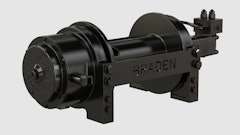Hey, you just rented 10 units at your standard rate to a new customer, and these are the biggest units in the fleet, which have the top rental rate. In this environment, that is great news. Or is it?
Renting those 10 units might be a big deal or not, especially if you wind up in the 120 days on the monthly AR schedule, and if you post-bill the rentals it is even worse. You can rent the entire fleet at standard rates but let's face it, the only thing that counts are the collections received in a timely fashion.
Saying you are going to strive to collect in a certain amount of time and doing it are two different things. If you don't have credit procedures, rental application forms, have a credit approval process in place, get credit card information and track the outstanding balances it will be difficult to stay in control of collections.
Every rental company employs different credit policies. Some are very strict and will cut off the customer if they fall behind in payments. Some are more flexible and use a more flexible policy as a marketing tool (as long as they have the capital base to make it work). And some do not have adequate controls in place and always seem to have cash problems.
Rental company employees have to understand how the billing and collection process works. If you pre-bill the rentals the days outstanding are one thing, but if you post-bill the rentals you have to add another 13-18 days to the outstanding days because the unit has been in the field 13-18 days before you billed it. So if an invoice shows up in the 60-day column and you post-bill, then it is really closer to 75 days outstanding. Big difference.
Your sales personnel also need regular current information to help with the collection process. The word "current" is stressed because the worse thing you can do is have a sales person contact a customer with out-of-date information about their account. A good start is to provide a weekly AR report for each salesman, which includes an aged AR schedule by customer as well as the supporting detail including invoice numbers.
Numerous companies pay their salesmen based on collections and not billing, where only collections that fall within the company guidelines are paid, and those collected past the current guideline fall outside the commission base. While this system can cause problems it certainly keeps the sales staff in the game. Once an invoice gets close to the "fall-off" date, you can bet the salespeople know all about it and are calling to find out what the problem is.
Any new customer that calls for first-time rental needs to complete a proper application and provide information for your credit bureau to check. At this time you also get credit card information. If this customer needs a rental unit before you can get your credit check back, they need to authorize a credit card payment for a weekly rental in case the credit report comes back with a negative response. Only the boss should be authorized to override this policy.
Credits, credits, credits. Probably the #1 reason your receivables are messed up. We all know customers who use this tactic to stall payments, and we allow them to do this and so they continue to do so. The trick here it to get the credits agreed to and issued ASAP without exception, because once you let them sit on the books, your AR balances in the "over 120 days" column are sure to increase. Another negative regarding credits is that if you don't issue them currently, you will keep rehashing the issue over and over because no one remembers what you discussed a month ago. You can spend a lifetime dealing with credits, when you don't have to. Get them resolved and off the books.
At some point in time, every one of you will need a full-time AR person to contact customers, follow up on problems, converse with sales personnel, send documentation, keep track of lien dates and finally get permission to send accounts to collection. Pay plan incentives need to be tied to the total AR balances and balances that fall beyond 90 days from the billing date. Monthly collection goals are also a must. Of course, management needs to monitor these activities to determine if the approach is too strong and is costing the company business. Conversely, if the sales team is involved you will hear about potential problems.
Placing a lien on a customer's job is quite often necessary, and the collection staff is responsible for tracking these dates. And when necessary, having a formal collection process in place more than pays for itself. Not only do you get paid a percentage of what you sent over, you get reports which help with future credit decisions. Keeping the sales staff involved at these times is critical because many times the salesman can get the customer to pay to avoid the lien or collection effort.
And last but not least, you need a rental-friendly system to help your employees navigate through this process with valid, current information. If you don't have such a system in place, you will be spending a lot of time pushing paper around as your AR balance grows.
The rental business is made up of two steps: rent it and collect it. I hope you are concentrating on both.





















